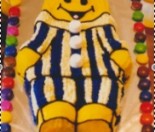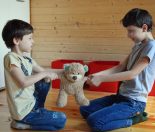Today I am going to sound like a “Grumpy Grandma.” I am going to tell you all about 4 common labels that disempower parents. These really annoy me because they are supposed to be common wisdom for parents. They are in no particular order of dislike.
Attention-seeking behaviour
This phrase seems to cover and explain a whole raft of behaviours: hitting, arguing, showing off, whining, demanding, fighting, rowdiness … in fact, most behaviours that come under the general heading of “naughty” (if you can cope with the term) or “undesirable” (if “naughty” is too un-PC for you.)
Most of those behaviours have nothing to do with the need for someone to take notice and are behaviours that need to be stopped. By dismissing them as “attention-seeking behaviour” we place a character fault on the child – presumably for needing attention – and absolve ourselves from responsibility for dealing with the behaviour.
In terms of personality, one of the needs of the Sanguine, outgoing, charming child is the need for attention. These children (and adults) simply need people to take notice of them and to like what they do. It is not a fault to be corrected. It is an aspect of their personality.
Our strong willed, hot-tempered, goal-focused Choleric children also need us to notice what they are doing and to admire their achievements. It may look like attention-seeking, but it is an imperative of their personality,
Attention-seeking behaviour is not some dreadful affliction that we need to get rid of. Some of the behaviours (hitting, arguing, showing off, whining, demanding, fighting, rowdiness) we ascribe to “attention seeking” are probably behaviours we should be paying attention to and getting rid of.
The “look at me, be with me, play with me” child needs us to say “yes” when we can and “no” when we can’t – and to accept that “no” without a catastrophic meltdown. Teaching them to take “no” for an answer is our job.
Sibling Rivalry
This is a term we use when we try to explain and maybe excuse siblings being competitive, siblings being unkind to each other or siblings fighting. The implication behind it as that our children are being rivalrous for our attention. Unfortunately, that leads us to believe that, instead of developing systems for fair taking of turns, stopping unkindness and stopping fighting, we are stuck with “compulsory” sibling scraps that are caused by them being siblings and therefore cannot be stopped. Alternatively or additionally, we may try to solve our children’s behaviour by giving them more individual attention in the forlorn belief that, if we do that, the rivalry for our attention will somehow magically cease.
The first reality is that where there are siblings there is bound to be some scrapping. We can stop it if we want to through fair systems and refusal to accept verbal unkindness and physical hurting.
The second reality is that most of our children have more than enough parental attention and giving them more will not solve disputes between siblings.
Terrible Twos
It is important for our children to follow our lead and to do as they are told. If we want our children to grow up to be civil and self-disciplined, it is essential that they learn to obey simple household rules (for our peace and for their safety) and accept their parents as the adults with appropriate authority who can be relied upon when they are upset.
Somewhere between the ages of ten and sixteen months our children begin to deliberately do things that they know they are not supposed to. At this point they need us to put limits on their inappropriate behaviour. The term ‘terrible twos” has emerged because two year-old have discovered the joy and power of “No.” It is absolutely essential that they reach the point of individuating – when they see themselves as separate, independent little people with opinions that differ from their parents. Otherwise, they would never grow up to adult independence.
At the same time, we need to insist that they do as they are told to simple instructions while giving them lots of freedom to play freely and safely.
If we believe that “terrible twos” is some compulsory phase that children will grow out of, we are disempowered when it comes to our (presumably advanced) pre-two toddlers who are touching things they shouldn’t be, hurting others and creating havoc.
“Terrible twos” also implies that we don’t need to act on bad behaviour because presumably by the time they reach three, they will have stopped being “terrible twos” and turn into kind, co-operative three year-olds. Yeah, right!
Many of us have waited for this transformation to take place…and waited…and waited…and waited. While it is true that children naturally give up on some behaviours, a non-compliant eighteen month old is likely to grow into a non-compliant four year-old unless we take some steps to deal with the non-compliance.
Let’s liberate ourselves from this disempowering phrase and start to think of them as the “Terrific Two’s”.
Terrible Teens
If trying to contain undesirable behaviour is difficult when they are under the height of 3 feet 6 inches, we are frequently told “Just wait till she is a teenager.” While I do agree that parenting teenagers has a whole heap of challenges, sleepless nights and occasionally despair, to dread or give up because they are “terrible teens” completely disempowers us as parents.
I would far prefer to think about the teen years as a time when all the support and boundaries of parenting a child till puberty, sets a foundation for what is to come in the teenage years.
They are going to need lots more support from us as they ferry themselves through all the wonderful challenges and terrifying threats to their well-being, that is characteristic of being a teenager in the 21st century. More than ever, they will need us to listen to their upsets and advise so subtly that they won’t even realise that it is advice and simply think it was their own wonderful idea.
They will also need us to put limits on their inappropriate behaviour and again, we are going to need to be subtle. We will be at our most effective when we decide what we will or will not do for them rather than make them do or don’t do a particular action.
Above all, they need our positive regard more that ever and thinking of them as “terrible teen” makes it very hard to be powerful parents who see their teen in a positive light.
That child needs anger management
Very often, I get a call from a parent who asks me if I “do anger management for children.” Most often this has come from an angry outburst and possible some physical response and a well meaning friend or teacher has said, “Your child needs anger management.”
This phrase implies that the child needs to be taken to someone (rather like taking a car to a panel beater) who will help them to not be angry or to control their anger. Notice how this disempowers the parent. Firstly, there is something “wrong” with the child that needs to be fixed. Secondly, whatever is wrong is beyond the parent’s competence so need some expert to work with the child. How disempowering is that.
The first question I like to ask is, “Is your child strong-willed?” IF the answer is a variation of “You cannot imagine just how strong-willed s/he is,” then we are not dealing with an anger management problem.
When a strong willed, goal focussed, controlling choleric child or adult is crossed, their first response is likely to be anger. As much as the sanguine, fun-loving child is programmed to control by charm and the perfectionist, sensitive, melancholic child is driven to control through mood and the peace loving phlegmatic child is programmed to control through procrastination, so is our strong willed child programmed to control through anger. There is no personality disorder. Anger is what they do.
Should we accept it and give up. “Yes” to the former and “No” to the latter. Our string willed child needs to control their own anger, so that they don’t hurt people (verbally or physically), so that they accept and do when their parents or teachers ask them to do something, and so that they can manage the ordinary age-appropriate frustrations of life.
Our job as parents is to upskill ourselves so that we respond appropriately when our strong willed child is using their anger to inappropriately control situations that are beyond their capacity, wisdom or experience. In other words, even though they are strong-willed, controlling and angry, they still need to do as they are told to reasonable requests from responsible adults. Let’s not be disempowered by the fact that they are angry.
Let the revolution begin
It’s time to start the revolution. We parents will no longer be disempowered by punishing phrases like “Attention-seeking behaviour”, “Sibling Rivalry”, “Terrible Two’s”, “Terrible Teens” or “Anger Management”.
We are going to give our children suitable support for their feelings and we are going to admire their efforts. We are going to insist that our households are ones of peace and that our children treat their siblings and their friends well. We are going to enjoy the developmental stages of our two year-olds and our teens and guide then as best we can through their own “revolutions.” We are going to rejoice in our children’s temperament whatever it may be and help them enjoy the strengths and minimize the weakness of their own personalities.
Above all, we intend to be powerful parents who will learn new skills when required and look for problem behaviours to be resolved rather than “problem children to be cured.”
To paraphrase an empowering song from the protesters of the sixties, “We shall not be disempowered.”






